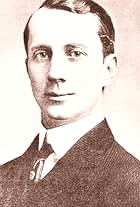Carl M. Leviness(1885-1964)
- Actor
- Director
- Second Unit Director or Assistant Director
Carl Leviness is a perfect example of somebody who appeared as an extra in films because they loved doing so. The distinguished looking Leviness started appearing in stage productions in the early 1900s. He eventually got a job at the Thanhouser Company as an actor in many of its' silent films in what was the start of a long colorful career.
By the early 1910s, Leviness became an assistant director for some of the films produced by Thanhouser. Like many people in their job, Leviness wanted to move up the ladder and he eventually left the company to go to get work as a director in early films. Eventually companies wanted to get away from Thomas Edison and his desire to corner the market on films and to own everybody's work so they all migrated to California.
Leviness was never too comfortable with dialog and while his appearance was ideal for socialite sequences, Livess was only in his 40s when he started appearing in film. Whether then fight the daily grind of trying to get a speaking role in films, Leviness drifted into the background and appeared in various productions.
Heavily admired by his peers, directors like John Ford and Alfred Hitchcock regularly put Leviness and other old timers to work in their productions. Ford respected him so much that he usually put him in little roles that required a small bit of dialog or for the actor to be ungraded to a silent bit. He eventually retired shortly before his death but not before leaving a reputation of being loved and respected by everybody who worked with him.
By the early 1910s, Leviness became an assistant director for some of the films produced by Thanhouser. Like many people in their job, Leviness wanted to move up the ladder and he eventually left the company to go to get work as a director in early films. Eventually companies wanted to get away from Thomas Edison and his desire to corner the market on films and to own everybody's work so they all migrated to California.
Leviness was never too comfortable with dialog and while his appearance was ideal for socialite sequences, Livess was only in his 40s when he started appearing in film. Whether then fight the daily grind of trying to get a speaking role in films, Leviness drifted into the background and appeared in various productions.
Heavily admired by his peers, directors like John Ford and Alfred Hitchcock regularly put Leviness and other old timers to work in their productions. Ford respected him so much that he usually put him in little roles that required a small bit of dialog or for the actor to be ungraded to a silent bit. He eventually retired shortly before his death but not before leaving a reputation of being loved and respected by everybody who worked with him.

























